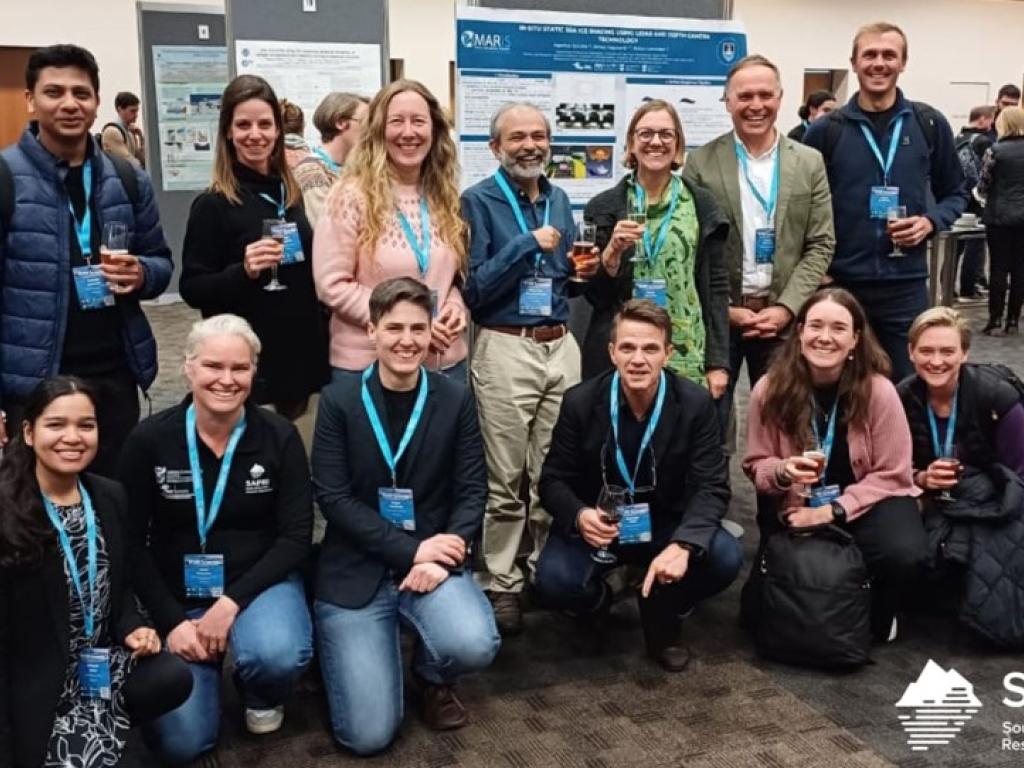Southern Ocean in a Changing World

South African Polar Research Representatives at SOOS Symposium 2023

300 scientists from 25 nations met in the Antarctic gateway city of Hobart, Tasmania, from the 14-18th August 2023 for the first-ever international conference of the Southern Ocean Observing System (SOOS) Symposium 2023, “Southern Ocean in a Changing World”. The conference consisted of plenary presentations, parallel sessions and workshops.
The central hub of SOOS is located in the Institute for Marine and Antarctic Studies (IMAS) at the University of Tasmania. Their mission is to provide an international forum where scientists from around the world work together to define the big questions facing Southern Ocean science, and to promote and coordinate the national-level observing activities needed to achieve those scientific goals.
UCT-MARiS was represented by Prof Marcello Vichi, Robyn Verrinder and ECR, Chemical Engineering Student, Safiyyah Moos. They were also joined by various MARiS associates, from CSIR, SAPRI, SAEON, ALSA, Stellenbosch University, etc.

Prof Vichi mentions that it has never been a more timely opportunity to meet together with the best experts in Antarctic and Southern Ocean processes at the SOOS symposium. We are entering an entirely new state in Southern Ocean Sea ice in an abrupt way. It is too early to label this as a tipping point or climatic shift, but when the largest seasonal cycle event on the Earth goes through a series of consecutive minima that are unprecedented in the continuous observational record since 1979, we have to pay full attention. Scientists are well aware of the large variability in sea ice cover around Antarctica, which eluded our capacity to simulate it in climate models. We also know that earlier satellite data from the 60’s and other proxies from whale catch data and Antarctic ice sheet cores give evidence of either higher or lower sea ice cover than the one experienced over the past two years.
Last year in late-July, MARIS scientists were on board the SA Agulhas II during the last lag of the SCALE expedition (https://www.scale.org.za). We observed anomalous conditions in sea ice since we deployed instruments in consolidated conditions more typical of the winter Antarctic Sea ice but we recovered them after a few days when the ice cover was resembling spring conditions. The persistence of a similar state that started even earlier during the advancing phase of seasonal sea ice are alarming and would require a careful monitoring from the international community and South Africa. South Africa is one of the principal custodians of Antarctica, being an early signatory of the Antarctic Treaty and maintaining a continuous presence on Antarctica and the Southern Ocean through the Department of Forestry, Fisheries and the Environment (DFFE) and the South African Polar Research Infrastructure (SAPRI).



Chemical Engineering PhD student, Safiyyah Moos mentions, “It was a great experience at my first conference and I feel like I learnt so much, in terms of science but also the importance of ECR networking. I was privileged enough to attend the first ever Southern Ocean Observing Systems (SOOS) Symposium held in Hobart, Tasmania. The theme for this symposium was, "Southern ocean in a changing world", a sentence that was highlighted throughout all of the presentations during the week."
The Antarctic Sea ice extent has been on a decline and reached a record minimum this year, which is a phenomena that no one - not even the current models - has predicted. The overarching questions resonating amongst the attendees were, why haven't we seen this coming and how can we, as the ocean and polar science community, as modellers and experimentalists, work together to achieve the common goal of shedding light on this changing ocean. These aren't easy questions to answer, but the aim of gathering our community at workshops, conferences and symposiums such as these, is to take the necessary steps to achieve an answer. The mission and aim of the SOOS Symposium is to gather scientists, engineers, and researchers from around the world to allow for a coordinated effort in achieving the answer.
Regarding her experience at the symposium, Safiyyah also mentions "my research is quite different to the large-scale work conducted by many of the fellow attendees and coupled with coming from an engineering background, it was an enlightening experience to learn about the inter- and multidisciplinary science that takes place surrounding the Southern Ocean. The conference had many different sessions focusing on areas such as biogeochemistry, algae, modelling, sea ice and shelf ice, which helped to facilitate with learning across disciplines. It was a great opportunity to network and meet established researchers at the forefront of their field, and I am extremely grateful for the opportunity to have attended the symposium.”
A special congratulations to Safiyyah Moos, who is also the current MARiS ECR Deputy Rep, for representing the MARiS ECRs so well at the SOOS Symposium 2023 in Hobart, Australia; she also received the ECR Best Poster Presentation award, with her poster titled: “Investigating the dynamics and exchanges across the ice-ocean interface in artificial sea ice.” The UCT-MARiS Team is incredibly proud of you!

